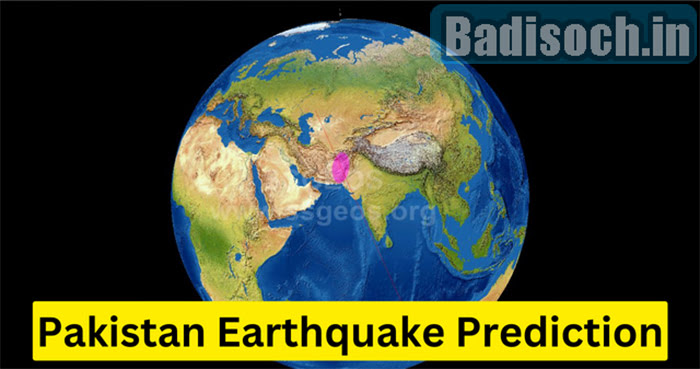Pakistan Earthquake Prediction : Recently, social media has been abuzz with rumors of a potential earthquake in Pakistan after a post by a Dutch research institution. However, an expert from the Netherlands has cautioned against jumping to conclusions or making hasty judgments about earthquake forecasts for Pakistan. According to a researcher at the Solar System Geometry Survey (SSGEOS), there have been significant changes in the air patterns in certain areas of Pakistan, which could be indicative of an impending stronger tremor. However, it is crucial to wait for more scientific evidence before drawing any conclusions or making predictions. It is important to note that earthquakes are complex phenomena, and their prediction requires careful analysis and interpretation of multiple factors.
Earthquakes are a natural disaster that can strike without warning, causing widespread devastation and loss of life. The ability to predict earthquakes is still a topic of ongoing research and debate. In this blog post, we will explore the current understanding of earthquake prediction in Pakistan, including the methods used, the challenges faced, and the potential implications for public safety. Whether you’re curious about the science behind earthquake prediction or concerned about the risk in your area, this blog post will provide valuable insights into this complex and important topic. So, let’s dive in and learn more about earthquake prediction in Pakistan.
Pakistan Earthquake Prediction
Dutch scientist Frank Hoogerbeets has advised against making hasty conclusions about potential predictions for earthquakes in Pakistan, despite some people expressing curiosity and concern about these fluctuations. On September 30, atmospheric changes were observed in Pakistan and its surrounding areas. Hoogerbeets, who has previously used planetary alignments to forecast fatal earthquakes in Turkey and Syria, acknowledged the accuracy of these variations in a social media post on X. He suggested that they could potentially indicate the occurrence of a stronger earthquake in the future, similar to what happened in Morocco.
Predicting the exact timing of an earthquake is currently not possible with our current technology and understanding of seismic activity. In February, a scientist’s prediction of an earthquake hitting Pakistan and India was dismissed by the United States Geological Survey (USGS) as no reputable scientific organization has yet been able to predict significant earthquakes. Although there are ongoing efforts to improve our knowledge and prediction capabilities, it seems unlikely that we will acquire this knowledge anytime soon. It is important to continue studying seismic activity to better understand how earthquakes occur and their impact on society.
Pakistan Earthquake Prediction Details
| Article Name | Pakistan Earthquake Prediction |
| Category | News |
| Official Website | Click Here |
 |
|
| Telegram |
Also Check: Social media platforms in India
Expert Opinion about Pakistan Earthquake
Despite significant advancements in technology, seismologists worldwide still face difficulties in accurately predicting earthquakes. Although it is possible to estimate the likelihood of earthquakes occurring in certain regions due to high seismic activity, pinpointing the exact locations and timings remains a challenge. Scientists continue to study seismic patterns and work towards developing more precise methods of earthquake prediction using data from seismometers and other advanced equipment. However, due to the unpredictable nature of earthquakes, it is impossible to guarantee accurate predictions at this time.
Pakistan is located in an area with high seismic activity due to the intersection of the Indian and Eurasian plates. As such, earthquake predictions should be treated with caution, especially when they are made by well-intentioned scientists. While certain methods such as studying past seismic activity or analyzing fault lines can provide some insight into the likelihood of an earthquake, the unpredictable nature of these events makes it impossible to accurately predict when they will occur. It is crucial for individuals living in seismically active zones to be prepared and have emergency plans in place, rather than relying on earthquake predictions that may not be reliable.
Check Here: Balaji Speciality Chemicals IPO GMP Today
What Pakistan’s National Seismic Monitoring Centre says
According to the NSMC, officials claim that despite a previous earthquake on the Chaman fault line in 2013, predicting when the next one will occur is difficult. The Chaman fault line is a tectonic boundary between the Eurasian and Indian plates, located in Pakistan and Afghanistan. The region is known for its seismic activity and has experienced several devastating earthquakes in the past, making it crucial to monitor and prepare for future quakes.
When asked about the prognosis of the Dutch scientist’s predictions, officials from the NSMC responded by stating that although a fault line could result in an earthquake, it is challenging to predict when one would happen with accuracy. This is because earthquakes are complex phenomena caused by various factors, including the type of fault and the forces acting on it. Therefore, it is essential to continue monitoring seismic activity and gathering data to improve our understanding of earthquake prediction.
Look Here: The Cast Of Tulsa King
Pakistan Meteorological Department
The Met Office, while rejecting the claims, stated that accurately predicting the timing and location of an earthquake is a challenging task. Regarding the PMD, Pakistan is located at the meeting point of two extensive tectonic plates extending from Sonmiani to the northern region of the country. Any area within these boundaries is prone to experiencing seismic activity.
As per the PMD, there were two notable earthquakes that took place along the Chaman fault line. The first occurred in 1892 with a magnitude ranging from 9 to 10, while the second one devastated the Chiltan range in 1935 and resulted in the loss of thousands of lives. According to the Met Office, there is a possibility of another earthquake occurring along this fault line approximately every hundred years. The Met Office has issued a statement stating that they have not received any warning or instructions pertaining to an earthquake.
Dutch researcher foresees major earthquake in Pakistan
Frank Hoogerbeets, a Dutch researcher affiliated with the Solar System Geometry Survey (SSGEOS), has made a bold forecast that an earthquake of significant magnitude will occur in Pakistan’s Balochistan region and have far-reaching impact throughout the country. Hoogerbeets, renowned for his unconventional use of planetary geometry to predict earthquakes, issued a warning to the public via social media.
In a tweet on Friday from his X account (previously Twitter), he mentioned that the interpretation of planetary geometry is challenging due to four spaced out conjunctions over the next ten days. According to him, October 1st through 3rd will hold significant importance. The Solar System Geometry Survey (SSGEOS), headquartered in the Netherlands, has established itself as a pioneer in earthquake prediction. To forecast potential earthquakes, they rely on their groundbreaking software called Solpage and the Solar System Geometry Index (SSGI), which depend on specific planetary alignments, as well as the positions of the Moon and the Sun.
Read More: Hospitality meaning in Hindi
How does Dutch SSGEOS calculate the risk factor?
The Solar System Geometry Survey (SSGEOS) has gain a reputation for its accurate seismic forecasts and has recently predicted a major earthquake in Pakistan. The Netherlands-bas organization has given a timeframe of 48 hours for the event to occur. While the prediction may cause panic, it is essential to stay inform and prepare for potential natural disasters. It is important to follow safety guidelines and have emergency plans in place to minimize damage and ensure the safety of individuals and communities affected by the earthquake.
SSGEOS aims to monitor changes in electric charge in the atmosphere near sea level, which may indicate areas that are more likely to experience heighten seismic activity. This technique can be us to forecast earthquakes and typically covers a period of one to nine days. By analyzing variations in electrical charge, SSGEOS hopes to provide accurate and reliable earthquake forecasts that can help mitigate the impact of these natural disasters. The technology us by SSGEOS is constantly evolving, and ongoing research is being conducted to improve earthquake prediction methods and accuracy.
Conclusion
Predicting earthquakes is a complex and challenging task. While scientists have made significant advancements in understanding the causes and patterns of earthquakes, accurately predicting when and where they will occur remains elusive. In Pakistan, which is located in a seismically active region, earthquake prediction is of great importance for the safety and well-being of its population. Researchers and experts in the field are continuously studying seismic activity and collecting data to improve our understanding of earthquake behavior in the region. By analyzing historical data, monitoring ground movements, and studying fault lines, scientists can make educated assessments about the likelihood of future earthquakes.
Pakistan Earthquake Prediction FAQ’S
Is earthquake predicted in Pakistan?
The statement said, No significant earthquake has ever been predicted for Pakistan by the USGS or any other scientific organization.
Is there any earthquake prediction?
No. Neither the USGS nor any other scientists have ever predicted a major earthquake. We do not know how, and we do not expect to know how any time in the foreseeable future.
Does India will have earthquake?
The government, around 59 per cent of India's land mass is prone to earthquakes of varying intensity. Cities and towns in eight states and Union Territories are in zone-5 and are at risk of earthquakes of the highest intensity.
Related Post:
